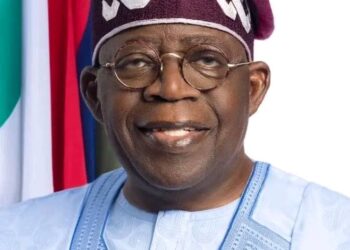Professor Michael Umale Adikwu mounted the pulpit of the University of Abuja as vice-chancellor when the institution was facing crisis. Usman Adam, writes that Adikwu’s tenure has buried the regime of strikes in the institution.
The journey
About 48 months ago, , a Professor of Pharmaceutics and Head of Department (HOD) at the University of Nigeria, Nsukka, Michael Umale Adikwu, assumed office as the vice-chancellor of university of Abuja, after rigorous selection exercise.
Prior to his appointment, little was known about this intellectual, who has won so many scholarly and academic awards numbering over 107 from the result of research works he had successfully carried out while at the University of Nigeria, Nsukka.
It is, therefore, not out of place to let the public know a few things about this university administrator as he begins the last 12 months of his tenure as university of Abuja’s chief executive.
Adikwu’s journey to this illustrious academic career began in 1970 when he enrolled in St Paul’s Primary School, Utokon, a village in Benue state, which many people may not be able to locate on the map of Nigeria, the situation which may provoke a remark similar to the one by the Jews over two thousand years ago, when they questioned whether anything good could come from Nazareth when they heard of the news of the birth of Jesus.
But Dr. Edwin Ogbu, of blessed memory, a native of the same village, became the first Nigerian to be made a permanent secretary in the Federal Ministry of Finance in 1963, the year professor Adikwu was born and was later made the Nigerian Permanent Representative at United Nations (UN) in New York. This is to discount the widely held notion of the negative influence of environment on the lives of people, especially youths.
At the youthful age of 35, Adikwu became a professor of pharmaceutics after acquiring a second class upper division degree, a master’s degree and PhD in the same discipline.
In all his academic career, Adikwu never attempted to cut corners he methodically followed one step after the other and up to the time he applied for the job as the Vice-Chancellor, University of Abuja, he was regarded by most of his compatriots as a fulfilled man with several publications of his research works in both national and international professional journals.
Lessons to learn
The above narrative is important in view of what some of our youths and parents these days indulge in cutting corners to achieve immediate gains. It is also a testimony to the fact that from whatever background one may come from, one could achieve his fullest potentials through hard work and discipline as evident by Adikwu’s achievements.
After four years of his five year tenure as the chief executive of the University of Abuja, he has more than successfully tackled many of the problems that were prevalent when he assumed duties. It may be necessary to summarise what Adikwu met on ground when he assumed duties; these included frequent strikes by academic and non-academic staff, but mostly by the students of the university over the non-accreditation of their programmes as well as the allegation of forgery and racketeering of the university’s certificates and admissions that had almost defied all solutions. That was the summary of the unfortunate situation at the university when Adikwu came in.
This is not to discount the fact that the past university administrators before Adikwu did not achieve anything at all, but in a narrative of this nature it is important to remember what had taken place in the past in order to meaningfully plan for the future.
As James Joyce once wrote in his book titled: “A Portrait of the Artist As a Young Man, the past is consumed in the present and the present is living because it helps to bring forth the future’’
It is not certain whether Adikwu, was aware of this sordid event unfolding at the University of Abuja as at the time he applied for the job as the chief executive of the institution.
Character traits
However, those who are close to this intellectual avatar and who have watched his development over the years right from his primary school up to his undergraduate level at the University of Nigeria, Nsukka, are unanimous that in all areas of human endeavour, Adikwu had always taken whatever assignment that came his way very seriously. This attitude to work was applied with all seriousness to his assignment on assumption of duty as the vice-chancellor of the University of Abuja.
Consequently, today the stories that emanate from the institution are positive in all facets with the result for instance, in the upsurge in the number of those who now want to enter the university.
For example, over 30, 000 prospective students applied for admission into the university in the current academic year for just about four 4, 000 places as against the less than 5,000 that applied for admission prior to the time Adikwu came in.
Peace at UniAbuja
In addition, there is now a synergy and good working relationship and understanding amongst various segments of officials of the administration and the Students Union Government (SUG) which now operates without late or hindrance.
The prevailing peace and tranquillity now enjoyed allow academic work to continue uninterrupted. Students now know when they will graduate as against the situation in the past when students could not ascertain or predict when they would graduate. The issue of the medical students of the University is a typical example. After languishing for years, the University administration in conjunction with other relevant agencies such as the NUC, NMA Etc successfully resolved the matter leading to the graduation of the students in December, 2017 after 12 years.
Infrastructural development which was at low ebb, which caused problems in the accreditation of some courses, have witnessed rapid progress with the prudent management of scarce resources and the assistance from TETFund and other intervention organisations. New structures are continually being built on the campus while old structures are also being refurbished to provide conducive atmosphere for learning in order to achieve the objective of the University.
The future
When Adikwu eventually leaves the university after a meritorious service, he would do so happily, believing that he has done the needful and that the solid foundation being put in place will not only stand the test of time but be a legacy that he would love to leave behind.
Adikwu will be 56 years old when he completes his five year tenure. From all accounts, he has perform excellently well in his assignments and although government does not presently have a reward system in place for hard workers Adikwu still has so much to offer to his nation and humanity for many years to come given his antecedents.
Adam, a Pulic Affairs Analyst wrote from Abuja



